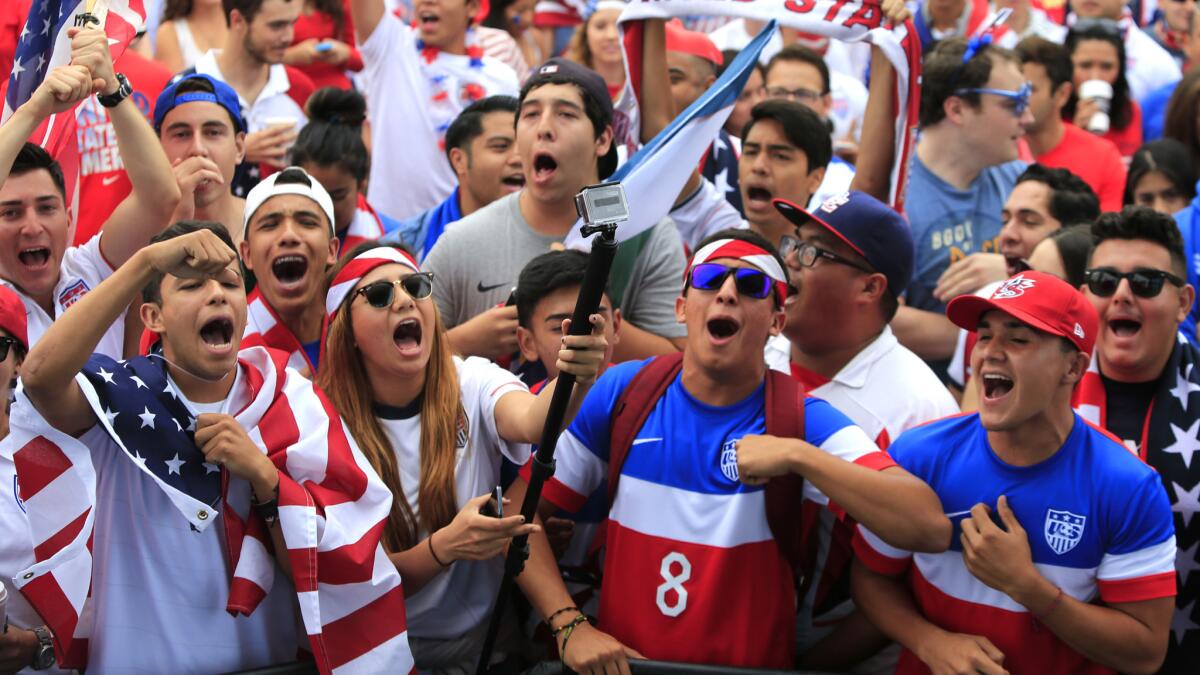A World Cup ‘bump’ for Major League Soccer? Not yet

- Share via
Three days after much of the country was riveted by the U.S. national soccer team’s dramatic loss to Belgium in the World Cup, the Galaxy played a Major League Soccer match at its home venue, StubHub Center in Carson.
The game against the Portland Timbers at the 27,000-seat stadium was a sellout last Friday. And Galaxy defender Omar Gonzalez, a key player on the U.S. team, was cheered as he stood on the field before the opening kickoff.
So, did the big crowd reflect a boost in soccer’s U.S. popularity thanks to the World Cup? It’s unlikely.
“It’s far too simplistic for us to look at tonight, a sellout crowd, and say this is because of the World Cup,” Galaxy President Chris Klein said. “Have our season-ticket sales spiked? Not yet.”
Indeed, before the World Cup began June 12, attendance at MLS games this season was averaging 18,497; it has since inched up to an average 18,503, the league said.
But Klein and MLS executives predicted that enthusiasm over the World Cup would gradually send more fans through turnstiles at MLS stadiums.
“There will be increased attendance,” said Mark Abbott, MLS president and deputy commissioner. “Over time and even this year [the World Cup] will have a positive focus. It’s the long-term, continued overall growth of the fan base.”
The World Cup occurs every four years, and Abbott noted that since the 2010 Cup, MLS’ average attendance has climbed 11% from 16,675.
As with the Galaxy’s Gonzalez, “people who fell in love with that [U.S. national] team this summer can literally go watch those players in their hometowns,” Abbott said. “That connection is a very important connection for us.”
The calendar also made it difficult to quantify any direct effect the World Cup had on MLS attendance.
After a three-week break in observance of the World Cup, the league resumed play June 25. That meant many of its teams’ initial games after the World Cup occurred over the July 4 holiday weekend, which typically is one of their most popular weekends every year.
The Galaxy, for instance, also sold out a year ago when it played at StubHub Center over the July 4 holiday.
Regardless, MLS executives said the fervor surrounding this year’s World Cup would benefit the league because the connection among U.S. soccer fans was unlike any World Cup in the past, thanks to advances in smart-phone technology, soccer-related websites and social media.
“Some of those people were new to the sport, but what it really shows is how large the audience is for the sport in the United States,” Abbott said.
“It’s less about whether we’re able to convert non-soccer fans into soccer fans; it’s exposing soccer fans to the quality of the league and the players we have in the league,” he said.
Klein said, “The reality is there’s 50 million soccer fans in this country and that was the number they had before the World Cup. The sport has enough of an audience to be wildly successful with just soccer fans.
“The World Cup may have turned some people’s eyes” toward attending MLS games for the first time, he said, but added: “The World Cup threw gasoline on the fire that we’ve already had.”
Twitter: @PeltzLATimes
More to Read
Go beyond the scoreboard
Get the latest on L.A.'s teams in the daily Sports Report newsletter.
You may occasionally receive promotional content from the Los Angeles Times.






